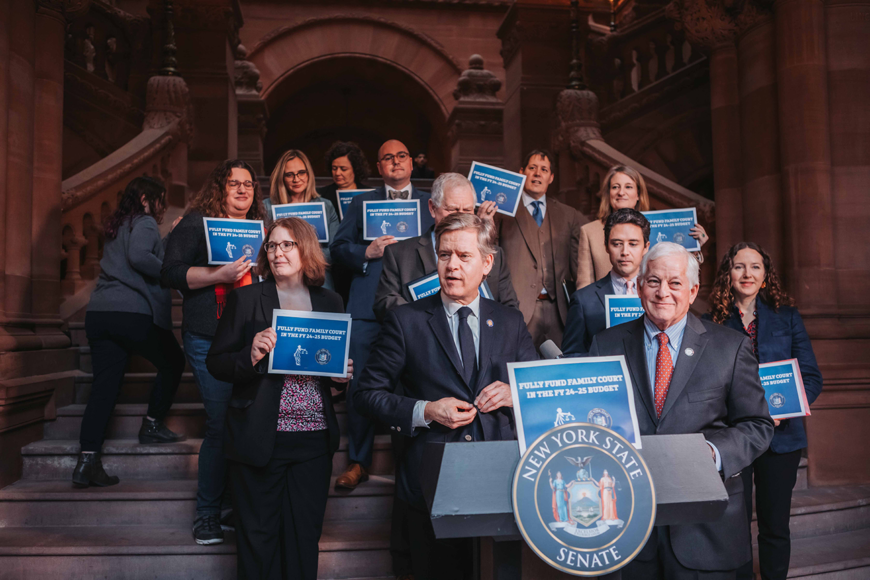New York Lawmakers Push For Major Investments in Family Court System


By Adilia Watson and Susanti Sarkar
Declaring the New York Family Court system “in crisis,” state lawmakers and legal advocates for children and families are calling for a major new public investment to improve the handling of foster care and youth justice cases.
Senators and assemblymembers are seeking a $102 million investment to fix the “overburdened and under-resourced” family courts, funds that would be included in the state’s next fiscal-year budget.
“Our family court system is in crisis here in New York and we need to do something about it,” Sen. Brad Hoylman-Sigal said at a Monday press conference. “The funding we are calling for will help to make up for the years of underinvestment that have led to a dysfunctional system that is simply not capable of providing justice to those who need it most.”
The budget proposal includes $50 million for the Office of Indigent Legal Services to improve the representation of parents facing child abuse and neglect allegations. Attorneys for children contracted through the Office of Court Administration would receive $19.7 million, and $6 million would go toward raising the pay rate for private contract attorneys, who in the recent past earned as little as $75 an hour.
Lawmakers also seek funding for 41 new family court judge positions and $6 million to improve supervised visitation in counties that do not have sufficient resources for parents and kids in foster care to visit in a safe and comfortable way.
Family advocates heralded the budget ask, which is backed by New York’s Chief Judge of the Courts Rowan Wilson and leaders of the New York Senate’s Committee on Judiciary and the Committee on Children and Families.
“It would be tremendously impactful and absolutely essential,” said William Silverman, a New York attorney and chairman of the Fund for Modern Courts, an organization focusing on court reform. “There should be a sufficient number of judges to meet the demands of very vulnerable populations. The safety and security of poor families and children should be getting a proportionate amount of resources.”
Richard Lewis, president of the New York Bar Association, agreed.
“When you have to wait three months, six months or more to have your case heard, it rips apart families,” Lewis said at the press conference this week. “It does irreparable harm to the children, it does irreparable harm to the parents.”
Lawmakers announced the $102 million proposal along with a joint report by the Senate’s judiciary and children and families committees, titled: “The Crisis in New York’s Family Courts.”
It is one of numerous damning reports in recent years that point to deep flaws in the quality of justice meted out in New York family courts. In 2022, the New York City Bar Association and The Fund for Modern Courts revealed “serious constitutional issues” and delays that “caused harm to thousands of families.”
Two years prior, a report commissioned by then-Chief Judge Janet DiFiore and authored by former U.S. Secretary of Homeland Security Jeh Johnson found racial injustices “so extensive and systemic in nature” that they require a wholesale overhaul of the New York state court system. Johnson’s report, based on nearly 300 interviews, described the family courts as providing “a second-class system of justice for people of color in New York State,” a system that is “dehumanizing” and churns over so many cases they are handled much like a “cattle-call.”
Concerns are widespread, lawmakers announced again this week, from “unjustified family separation,” to “exceptional difficulties for indigent litigants and people of color, and a lack of resources that make it difficult to manage cases adequately, retain staff, and hear cases in a timely manner.” Testimony has “made it abundantly clear,” they went on, “that New York’s Family Courts are overburdened and under-resourced, plagued by untenable caseloads, overworked staff, and a legacy of dysfunction.”
Attorneys representing children and parents have struggled for years to increase their compensation. In 2021, bar associations and lawyers representing parents in abuse and neglect cases sued New York City and the state for denying them fair pay, which leads to a “violation of the constitutional right of children and indigent adults to meaningful and effective legal representation.”
Last year, panel attorneys for children and parents received their first pay increase since 2004.
In addition to supporting the call for more judges and lawyers and better pay for legal counsel in the field, the state Senate’s report released this week included suggestions for improvement from parents, attorneys, government and court officials, as well as representatives of nonprofit agencies. Recommendations included providing support to households struggling from domestic violence, substance abuse and mental illness well before court intervention is necessary, and investing in alternative solutions to litigation such as problem-solving courts and dispute resolution.
The report also highlighted the need to better protect families under investigation by Child Protective Services following allegations of abuse and neglect — cases that more often than not center on conditions related to poverty and lack of resources.
To that end, the Senate report calls for “narrowing the front door” of the child welfare system by fully funding legal service providers and foster care prevention services, and protecting the rights of litigants in court.
A more stable bench with additional judges dedicated to the family court would also help, report authors state.
Legal advocates echoed this need, pointing to the disruption caused by a “revolving door” of bench officers — such as stand-in judges pulled in haste from civil court to cover calendars.
“They’re assigned and gone in a year or two, just when they are brought up to speed and get to know families’ situations,” said Philip Katz, a family court lawyer and member of the New York Family Court Assigned Counsel Association.
In an email, Karen Freedman, president of Lawyers For Children, said that she welcomed the $19.7 million in proposed funding for Attorney For the Child offices, which represent over 90% of children in family courts in New York City and many other parts of the state.
“We greatly appreciate this funding increase and the support of Senator Hoylman and others as a first step in addressing an enormous funding crisis,” she said. She added that attorneys in these offices represent 150 children at a time, which she called “unconscionable” and double the number it should be. Freedman said roughly $50 million is needed “to sustain holistic legal representation” with no more than 75 active cases per attorney.
“More judges without more attorneys for children to appear in their courtrooms will not improve the months and even years of Family Court delays imposed on the children and families who depend on the Family Courts to provide speedy, responsive, and equitable justice,” Freedman said.
The additional funding proposed this week would be a significant boost to a “completely underfunded” system, attorney Katz agreed, but he too noted that the solution did not go far enough, given how undervalued family courts can be in the judicial and legal professions.
“We can’t fix these kinds of problems with just money,” Katz said. “The culture of New York State courts is to treat the family courts as second-class citizens. And that’s very frustrating for the families we represent.”

